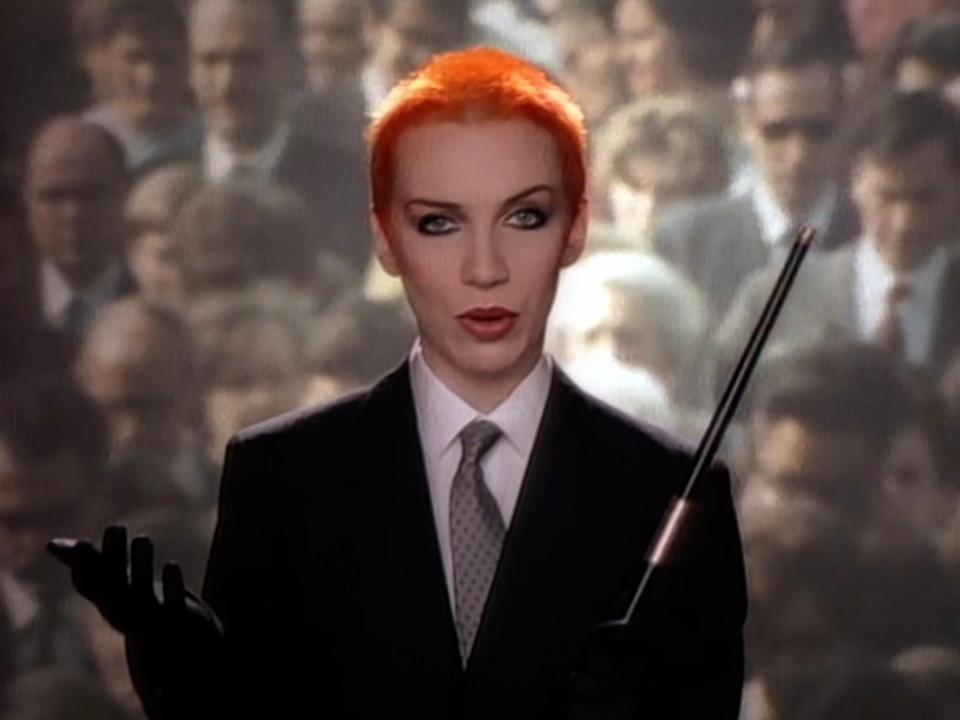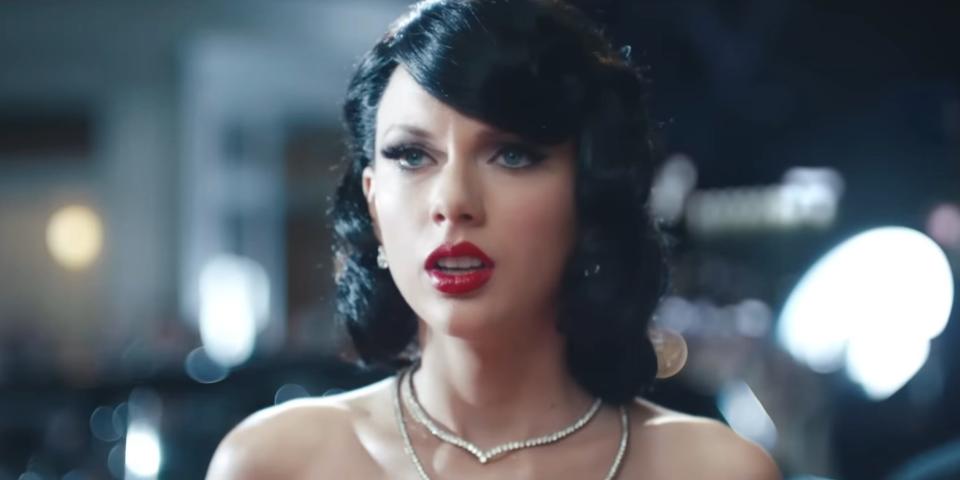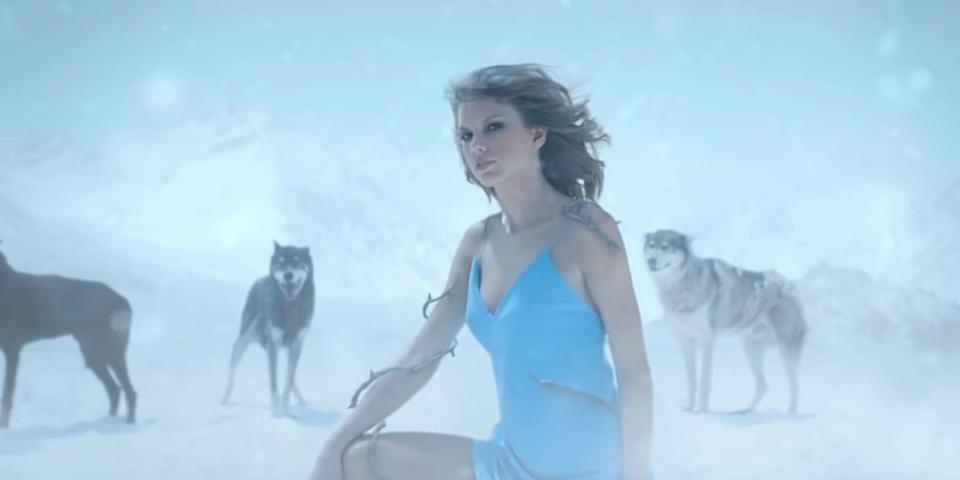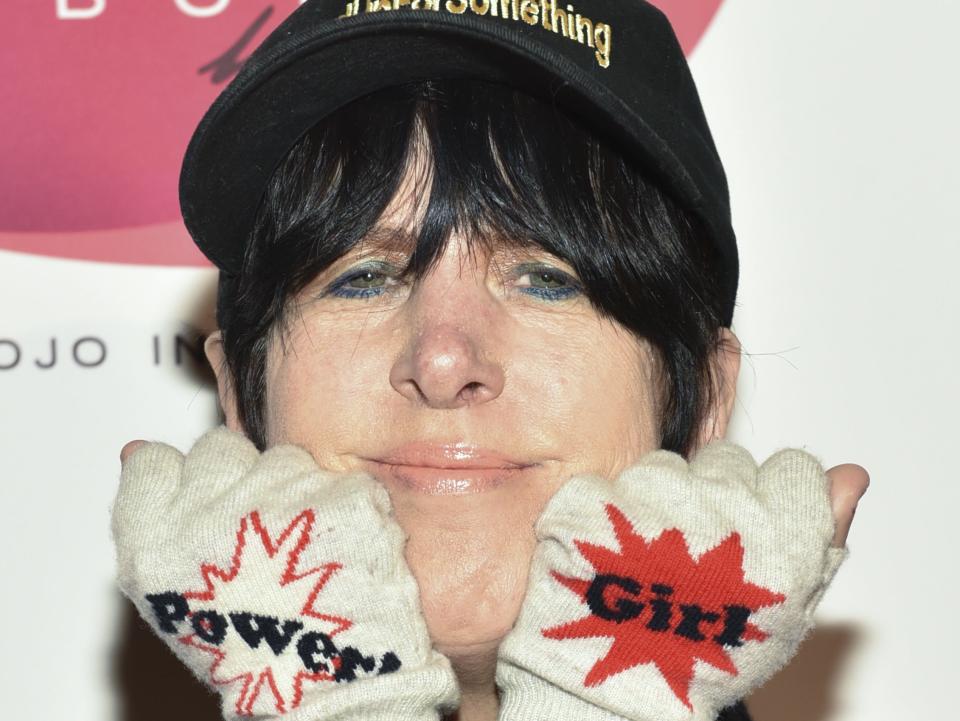13 fun facts about Taylor Swift's '1989' that you may not know

Taylor Swift released "1989 (Taylor's Version)" on October 27.
The original album broke records and became a flash point of cultural curiosity when it came out in 2014.
We rounded up 13 interesting details about the album and Swift's creative process.
Taylor Swift's "1989" is back in the news this week, nine years after it earned rave reviews and crushed expected album sales, transforming Swift into a full-blown pop star.
"1989 (Taylor's Version)" is already on track to eclipse the original's success, according to Billboard. The rerecorded and extended tracklist has already broken the record for the most-streamed album in a single day on Spotify (a record that was previously set by Swift's own "Midnights").
Initially released as Swift's fifth studio album, "1989" is a cherished and widely admired chapter in Swift's career. Going against her label's demands for more country music, Swift was determined to fully embrace the pop sounds she'd been toying with.
"Every single element of this album has been called into question, and I've had to say 'No, this is how we're doing it,'" she told Time in 2014. "It was all on me if this didn't work."
Luckily, it worked. "1989" moved 1.287 million copies in its first week and became Swift's best-selling album to date. It eventually spawned three No. 1 singles and won album of the year at the 2016 Grammy Awards.
Due to its success, the album has been discussed and mythologized at length. Most people know that "Blank Space" is satire, for example, and "Bad Blood" was inspired by Swift's since-buried feud with Katy Perry. But what of the less-publicized details and quirks from the creative process?
Keep scrolling for 13 fun facts about "1989" that non-Swifties likely don't know.
"This Love" was written before "Red" was even released.

"This Love" is the only song for "1989" that Swift wrote by herself.
According to excerpts from her diary, which were included with physical copies of her 2019 album "Lover," she wrote the song in Los Angeles on October 17, 2012 — five days before she released her fourth album, "Red."
The entry reveals how "This Love" was conceived in its entirety, with both verses, the chorus, and the bridge all finished together. The original lyrics also remained largely intact, except for a few tweaks and additions.
Before recording the final version, Swift added two key lines in the first verse: "And I could go on and on, on and on, and I will," "And you were just gone and gone, gone and gone."
She also adjusted a couplet in the second verse, which was initially written as, "Twisting, turning / Tried to keep warm with someone new."
In the song, Swift sings, "Tossing, turning / Struggled through the night with someone new."
"Shake It Off" and "Clean" were the last songs written for the original tracklist.

The original release of "1989" included 13 standard and three deluxe tracks.
Of those 16 songs, Swift said that "Shake It Off" and "Clean" were the last to be written, which "shows you where I ended up mentally."
"A heartbroken person is unlike any other person," she told Tavi Gevinson for the June 2015 cover of Elle. "Their time moves at a completely different pace than ours. It's this mental, physical, emotional ache and feeling so conflicted. Nothing distracts you from it."
Swift said she learned to "create new habits" in the wake of heartbreak, like "planning fun dinner parties and going out on adventures with your girlfriends." As time passed, she began to feel more peaceful.
"Then all of a sudden one day you're in London and you realize you've been in the same place as your ex for two weeks and you're fine. And you hope he's fine," she said. "The first thought that came to my mind was, I'm finally clean."
The liner notes reveal an outline of the album's story.

In the prologue for the original album, Swift described "1989" as "a different storyline than I'd ever told you before."
"I've told you my stories for years now. Some have been about coming of age. Some have been about coming undone. This is a story about coming into your own, and as a result... coming alive," she wrote.
Swift explained to NPR that while creating "1989," her songwriting had evolved to reflect the complexity of adult relationships, as well as her newfound "realism" when it comes to romance.
"In the past, I've written mostly about heartbreak or pain that was caused by someone else and felt by me," she said. "On this album, I'm writing about more complex relationships, where the blame is kind of split 50-50."
"Lots of things are gray areas and complicated situations, and even if you find the right situation relationship-wise, it's always going to be a daily struggle to make it work," she continued. "So those are different themes that I don't think people have really seen in my lyrics before."
We know the tracklist isn't ordered chronologically, given the late placement of "This Love," which was written in 2012. Swift moved to New York City in early 2014, which inspired the opening song, "Welcome to New York."
However, Swift did arrange the standard-edition album in a specific way, to tell the story of a sporadic relationship dynamic — a magnetic attraction that never seems to go away.
This is outlined in the form of secret messages, which Swift is known for hiding in her liner notes for fans to decode.
The secret message for each track is listed below:
Welcome to New York: "We begin our story in New York."
Blank Space: "There once was a girl known by every one and no one."
Style: "Her heart belonged to someone who couldn't stay."
Out of the Woods: "They loved each other recklessly."
All You Had To Do was Stay: "They paid the price."
Shake It Off: "She danced to forget him."
I Wish You Would: "He drove past her street each night."
Bad Blood: "She made friends and enemies."
Wildest Dreams: "He only saw her in his dreams."
How To Get The Girl: "Then one day he came back."
This Love: "Timing is a funny thing."
I Know Places: "And everyone was watching."
Clean: "She lost him but she found herself and somehow that was everything."
Swift's new sound was influenced by artists like Peter Gabriel and Annie Lennox.

As the title suggests, Swift drew inspiration from '80s artists while creating her first true pop album, specifically Peter Gabriel and Annie Lennox.
"Those were the two artists that I was listening to a lot when I was making this record," she told NPR. "What Annie does is so interesting to me, and it's not something you could ever try to duplicate. But the way she conveys a thought, there's something really intense about it. And I think that's something I'll always aspire to."
"With Peter, that's an artist who has such incredible taste and such an incredible finger on the pulse of what would excite people, musically," she continued. "What he was doing in the '80s was so ahead of its time, because he was playing with a lot of synth-pop sounds, but kind of creating sort of an atmosphere behind what he was singing, rather than a produced track."
Lennox found success as one-half of the British pop duo Eurythmics. In the music video for their 1983 hit "Sweet Dreams (Are Made of This)," Lennox made waves by sporting a "powerful androgynous look" that "defied the male gaze," per the BBC.
Gabriel is perhaps best known for his 1986 album "So," which became a massive commercial success led by the No. 1 single "Sledgehammer."
"Wildest Dreams" includes the sound of Swift's real heartbeat.

"Wildest Dreams" is a fan-favorite ballad that Swift described as "a really good example of the way I go into relationships now."
"If I meet someone who I feel I have a connection with, the first thought I have is: 'When this ends, I hope it ends well. I hope you remember me well,'" she told NPR in 2014. "Which is not anything close to the way I used to think about relationships. It's that realization that it's the anomaly if something works out. It's not a given."
Swift put her heart into the song — literally. What sounds like the lead drum pattern is a recording of her pulse.
Fans noticed this detail when the album was originally released. In the song's liner notes, Swift is credited as an instrumentalist for "heartbeat."
"You Are in Love" was inspired by Jack Antonoff and Lena Dunham.

Before Jack Antonoff became Swift's primary collaborator, they were introduced by her friend Lena Dunham.
Antonoff and Dunham had met on a blind date in 2012. They were together for over five years before their split was announced in 2018.
When Antonoff joined Swift in the studio for "1989," the duo cowrote several songs — including "You Are in Love," a song inspired by his relationship with Dunham.
"I wrote that song about things that Lena has told me about her and Jack," Swift told Gevinson in 2014. "That's just basically stuff she's told me. And I think that that kind of relationship — God, it sounds like it would just be so beautiful — would also be hard. It would also be mundane at times."
Antonoff used surprising sound effects to create the snare in "Out of the Woods."

"Out of the Woods" was the first song Swift had ever written to a pre-existing track. Antonoff recorded the instrumentals separately and sent her the demo, which she listened to on an airplane.
"I tend to want to create something with my guitar or piano and bring it in, then we create the track from the ground up," Swift told USA Today. "But with Jack, he has something very emotional about what he does when creating a track. I can kind of read that emotion as soon as I hear it, and we work very well that way."
"I came up with that melody, the verse and chorus, in about 30 minutes and sent it back to him," Swift continued. "Both of us were just freaking out."
To create the instrumental bed, Antonoff mostly used a Yamaha DX7, which is a digital synthesizer that became popular in the '80s. He balanced that in the chorus with a Minimoog Voyager, another synthesizer that was released in 2002.
"That sounds extremely modern to me. It's that back-and-forth," he told USA Today.
Antonoff also used a strange combination of real-life sounds to mimic the effect of a snare drum.
"In 'Out of the Woods,' the main snare is a combo of white noise [Jack Antonoff] got from blowing out the EMI board, clapping his hands, and, no joke, dropping his gear bag. He mic-d that up on the floor," she said in a video for Grammy Pro, per Billboard.
Swift came up with the hook for "All You Had to Do Was Stay" in a dream where she felt "mortified."

In a 2014 interview with Time magazine, Swift revealed the origin story for "All You Had to Do Was Stay," the pleading fifth track on "1989."
"I was having this dream, that was actually one of those embarrassing dreams, where you're mortified in the dream, you're like humiliated," she said.
"In the dream, my ex had come to the door to beg for me to talk to him or whatever, and I opened up the door and I went to go say, 'Hi,' or 'What are you doing here?' or something — something normal — but all that came out was this high-pitched singing that said, 'Stay!' It was almost operatic," she continued. "So I wrote this song, and I used that sound in the song. Weird, right?"
When Swift awoke from the dream, she immediately recorded the high-pitched bleat on her phone, thinking it was "too strange" not to include in a song.
"In pop, it's fun to play around with little weird noises like that," she added.
Swift played the original album for a few friends before it was released: Karlie Kloss, Lena Dunham, Ed Sheeran, and Lorde.

Asked about the first person to hear "1989," Swift told PopCrush that she played it for a few fellow musicians.
"I think one of the first people that I played the entire album for was my friend Ella, who goes by Lorde," she said. "She's one of my favorite people to kind of bounce ideas off of — she gives really good advice. And it's interesting to see what her favorites are."
"Another person that's heard the entire album is Ed Sheeran," she continued. "Having friends where who I completely respect their musical opinion is really helpful because they all have their different favorites and stuff, and their different favorites definitely reflect them as musicians, for sure."
According to Swift, Lorde's favorite album cut was "Welcome to New York," while Sheeran's favorite was "Bad Blood."
Shortly after, Swift told Ryan Seacrest that Karlie Kloss and Lena Dunham had also heard the album before its release.
"Karlie, we took a road trip to Big Sur and I played her pretty much the entire album," she said. "Lena Dunham has heard it beginning to end. She heard the stuff I was writing for two years."
Diane Warren, who cowrote "Say Don't Go," said the vault track has the exact same lyrics as it did in 2014.

Swift added five never-before-heard songs from the "1989" era to her "Taylor's Version" tracklist, including "Say Don't Go," which she cowrote with Diane Warren.
Warren, who has also penned songs for stars like Lady Gaga, Mariah Carey, Beyoncé, and Whitney Houston, recently told Rolling Stone that she was surprised it didn't make the cut for the original album.
"Everything has its time, you know? It took a while to see the light of day, but I'm glad it finally did," Warren said. "It was worth the wait."
Warren said she met up with Swift to write the song "from scratch" in late 2013. Shortly after, they recorded a sparse demo on New Year's Day.
"She was very particular about how she said certain things. It was a really interesting experience. She gets her audience," Warren recalled. "She's deeply aware of how her fans want to hear something. I can't explain it, but that's probably why she's the biggest fucking star in the world."
The legendary lyricist also confirmed that today's version of "Say Don't Go" has the same lyrics they wrote together nearly a decade ago.
"It still stands," she said. "It's timeless."
Swift said that "Slut!" felt too "California" to make the cut for the original album.

"Slut!" is another vault track that Swift cut from "1989" back in 2014, but later released with "1989 (Taylor's Version)."
In an audio clip for Tumblr Music, Swift said the song was too thematically similar to "Blank Space" to include both on the original tracklist.
She added that "Slut!" didn't quite fit in her cityscape vision at the time.
"I love this song because I think it's really dreamy," she said. "I always saw '1989' as a New York album, but this song to me was always California. And maybe that was another reason it didn't make the cut, 'cause sometimes thematically, I just have these weird little rules in my head."
She also described "Is It Over Now?" as the "sister" of "Out of the Woods" and "I Wish You Would."

"Is It Over Now?" is the final track on "1989 (Taylor's Version)."
"I always saw this song as sort of a sister to 'Out of the Woods' and 'I Wish You Would.' I kind of saw those songs as similar," she said in a Tumblr Music audio clip. "Unfortunately, when we were making these decisions on what to put on '1989' and what to leave behind, I had to make some tough choices."
Indeed, "Is It Over Now?" and "Out of the Woods" both deal with big rhetorical questions that threaten to destroy her relationship. ("Was it over when she laid down on your couch?" "Are we out of the woods yet?")
The newer song also describes a scene when Swift's ex "lost control," which resulted in "red blood, white snow."
This recalls the bridge in "Out of the Woods," when Swift sings, "Remember when you hit the brakes too soon? / Twenty stitches in a hospital room."
In 2014, Swift opened up to Rolling Stone about that verse, paraphrased by reporter Josh Eells: "She says it was inspired by a snowmobile ride with an ex who lost control and wrecked it so badly that she saw her life flash before her eyes. Both of them had to go to the ER, although Swift wasn't hurt. She corrects herself: 'Not as hurt.'"
"People think they know the whole narrative of my life," Swift told Eells. "I think maybe that line is there to remind people that there are really big things they don't know about."
"Now That We Don't Talk" was left behind because it was written too late.

Although "Shake It Off" and "Clean" were late additions that made the cut, Swift recently revealed the vault track "Now That We Don't Talk" was also written "towards the end of the process."
Cowritten by Antonoff, Swift said they "couldn't get the production right at the time," which forced her to abandon the song. It was finally released on "1989 (Taylor's Version)."
"We had tons of time to perfect the production this time and figure out what we wanted the song to sound like," she said in another Tumblr Music audio clip. "I think it's the shortest song I've ever had, but I think it packs a punch."
Read the original article on Insider

 Yahoo News
Yahoo News 
